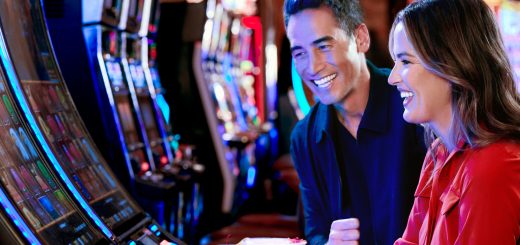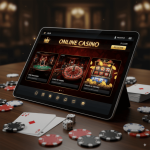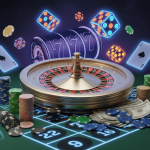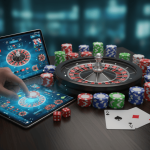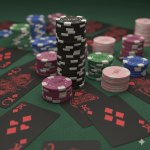The Player and the Phenomenon of “Empty Victory”: When Winning Brings No Joy
The Win That Doesn’t Land
Most casino stories end with a cheer. But a surprising number end with a shrug: the balance ticks up, the confetti animates, and… nothing. The player’s pulse barely moves. The moment’s bright design cannot color in a feeling that simply doesn’t arrive. This is the paradox of empty victory – a win stripped of joy, relief, or meaning. It happens at live tables and online hubs alike; whether you play casually or often, you might have tasted it. Maybe it followed a long session; maybe it came right after a hot streak. Maybe it happened last night while navigating a favorite lobby – say, exploring titles you first discovered through 5gringos5.gr – and you wondered, “Why doesn’t this feel like anything?”
This article is an unusually candid field guide to that feeling. We’ll unpack the neurobiology, the economics of attention, the stories we tell ourselves mid-session, and the design details that can either hollow out or fill back in a win. Most importantly, we’ll offer pragmatic tools – simple, humane, expert-level – to restore your sense that a win is more than a number.
What Exactly Is an “Empty Victory”?
An empty victory is a win that fails to deliver its expected emotional payload. The credits land, the balance rises, the outcome is objectively positive – yet subjectively flat. Players describe it as:
- Numb relief rather than joy (“It’s over, I guess”).
- Narrative confusion (“So… now what?”).
- Identity dissonance (“That didn’t prove anything”).
- Delayed regret (“Why don’t I just feel happy?”).
This is not the same as disappointment (where the outcome is worse than hoped). It’s absence where presence was promised.
Where the Joy Goes: A Neurobiology Snapshot
Three levers shape how wins feel:
- Dopamine and Uncertainty.
Dopamine surges most during anticipation, especially under uncertainty. When the result finally lands, the peak can already be behind you. If the path to the win was long, repetitive, or auto-driven, anticipation may have thinned out; the reveal arrives to a quieter brain. - Hedonic Adaptation.
The nervous system normalizes repeated stimuli. Ten small wins in ten minutes feel notable; the next ten feel routine. Without novelty, the emotional contour flattens. - Stress Chemistry.
If cortisol or adrenaline remain high (e.g., after a long chase, a near bust-out, or sleep deprivation), the nervous system may be too keyed up to translate success into pleasure. You “protect” yourself from a spike by staying muted.
A win lands on whatever state you’re in. If your state is tired, defended, or adapted, joy gets muffled.
Behavioral Economics: Why the Map Isn’t the Territory
A few well-studied dynamics help explain the mismatch:
- Reference Points.
We compare results to an internal baseline. If you’re down €300 and win €120, your brain places the win inside the larger frame (“still down €180”). Objectively positive, subjectively insufficient. - Loss Aversion & Relief.
We feel losses about twice as strongly as equivalent gains. A win after risk often reads as relief from potential loss more than a positive gain. Relief is quieter than joy. - Sunk-Cost Drag.
If the win follows heavy time or bankroll investment, the payoff might feel like reimbursement, not reward. - House-Money Illusion.
Treating previous winnings as expendable “other” money can blunt the sense that this win is truly yours.
The headline: the context of the win determines its felt value more than the number itself.
Narrative Collapse: When the Story Ends Too Soon
Most players are amateur storytellers. We enter sessions with implicit arcs:
- “I’ll claw back to even.”
- “I’ll double this stake and bow out.”
- “I’ll unlock the bonus round once.”
An empty victory often coincides with narrative mismatch:
- You win before your story says you “should,” and it feels premature.
- You win after your story has already broken (chasing, tilting), and it feels irrelevant.
- You win without a story at all (auto-spins while distracted), and it feels accidental.
Meaning arrives when outcomes resolve authored arcs. Without authorship, even good news feels generic.
Identity Dissonance: The Player You Are vs. The One You Played As
Who were you aiming to be tonight – careful curator, bold adventurer, methodical strategist, relaxed tourist? Empty victories tend to surface when identity expectations break:
- The Strategist’s Compromise: You won on a whim after abandoning your plan. Outcome good, identity bruised.
- The Adventurer’s Stall: You won by playing it safe. Balance rises; self-image dims.
- The Tourist’s Drift: You stayed longer than intended. The win clashes with a promise you made to yourself.
When behavior contradicts identity, wins validate actions you don’t endorse. The psyche withholds celebration.
Design Details That Can Hollow Out a Win
Even beautiful interfaces can dull meaning if they over-optimize speed:
- No Natural Breakpoints.
Instant transitions chain outcomes into an undifferentiated stream. Without a beat to acknowledge success, your mind moves on before it registers. - Over-Bright Micro-Wins.
Excess fanfare for tiny wins creates noise, not signal. When everything is “wow,” nothing is. - Phantom Money Displays.
Credits without clear currency mirrors disconnect outcomes from real value, muting impact. - Auto-Everything.
Automation is convenient, but it erodes agency – and agency is a critical ingredient in felt reward.
This isn’t an argument against polish. It’s an argument for contrast and conscious edges.
The Hidden Role of Fatigue, Night, and Solitude
Empty victories love poor conditions:
- Sleep Debt.
A tired brain protects itself by damping both spikes and dips – wins included. - Late-Night Drift.
With fewer interruptions, sessions stretch; hedonic adaptation speeds up; reveal moments blur. - Isolation.
Without social “witness,” there’s no external echo – no friend to celebrate, no dealer’s smile, no chat emotes. The moment has nowhere to resonate.
The fix isn’t to force daytime only. It’s to architect the night (time boxes, softer themes, pre-written exits) so wins can breathe.
Case Vignettes (Composite, Illustrative)
- Mara, 29, product designer.
After a draining week, she sets a casual 45-minute session. Twenty minutes in, she hits a €140 feature on a new slot. It feels flat. Why? She’d slipped into auto-spins, Slack still open. The win resolved a process she wasn’t consciously in. - Gus, 41, accountant.
He builds a careful blackjack progression and ignores it after two early losses. Fifteen minutes later, a double-down win pops him green – yet he feels nothing. His identity script (disciplined player) wasn’t the one who won. - Ana, 34, ICU nurse.
A night-shift wind-down turns into a 90-minute run. A €220 win lands, and she exhales… but not with joy – just relief. She pauses and realizes she’s been protecting a dwindling energy budget; her body couldn’t afford celebration.
These are not morality tales. They are state and story mismatches.
A Practical Diagnostic: Is It an Empty Victory?
Ask three fast questions:
- Did I anticipate this moment consciously?
If not, agency may be missing. - Does this resolve the story I intended to play?
If not, meaning lacks closure. - Do I feel relief, pride, or joy? Which is loudest?
If relief dominates, your system may be in guard mode – great time to end.
If two answers point to flat, you’re not broken. You’re informed.
Turning Wins Back into Wins: A Player’s Toolkit
1) Price the Story, Not Just the Spin
Write a micro-brief before you play: Tonight’s story is 60 minutes, discovery mode, €X entertainment spend, exit on +€Y/–€Z. When the win arrives, it closes a declared arc – your brain loves that.
2) Build a Quick “Win Ritual”
Ten seconds: mute the game, inhale, exhale, screenshot, name it (“+€95 on the new feature”). Ritual marks the moment so your nervous system tags it as meaningful.
3) Bank Early, Bank Visibly
Move a chunk to a “vault” immediately and see the number change in native currency. Visibility converts abstract credit into owned reward.
4) Guard Your Pace
Add light friction to stake increases (count to five; require a second tap). Breath between outcomes. Meaning needs a beat.
5) Play to Identity
Pick tonight’s persona (Explorer, Strategist, Socialite, Tourist) and check behavior against it. Identity-aligned wins land louder.
6) Curate the Sensory Temperature
Tired? Choose calmer aesthetics and gentler sounds. Wired? Go for cleaner, not louder, cues. The right texture helps the moment feel like yours.
7) Declare the Last Hand First
“After the next feature, I cash out – full stop.” Ending on a designed note lifts even mid-sized wins into satisfying finales.
For Social Players: Borrow Witness, Share Echo
- Live dealer or small chat can amplify a win’s resonance.
- One celebration text to a friend (“Called my exit at +€110 – done!”) turns private success into a social memory.
- Group norms – like everyone screenshotting and cashing at a preset target – protects meaning from drift.
Witness multiplies joy; secrecy multiplies flatness.
For Operators and Designers: Five Ways to Prevent Empty Victories
- Natural Intermissions.
After major features, slow the UI by design – offer a graceful pause, a shareable moment, or a simple “Bank Now” prompt. Not coercive, just inviting. - Honest Value Displays.
Show wins in credits and currency by default. Let players pin their preferred view. - Right-Sized Fanfare.
Calibrate micro-celebrations so small wins don’t drown big ones. Contrast creates salience. - Player-Set Reality Checks.
Friendly, self-authored reminders (“You planned 45 minutes; you’re at 40”) protect arcs without scolding. - Identity Modes.
Light, opt-in profiles (“Explorer,” “Strategist”) that adjust pacing hints, prompts, and UI nudge identity alignment – making wins feel earned within a player’s chosen style.
Design that honors no as much as yes is the surest way to keep wins bright.
The Psychology of the “Win that Proves Nothing”
Sometimes the emptiness is philosophical. A win may feel like it proves:
- Nothing about skill (it was luck).
- Nothing about desert (I don’t “deserve” it).
- Nothing about progress (I already planned to stop).
If what you sought from play was validation, a pure random success cannot deliver. The fix isn’t to chase a different outcome; it’s to choose a different goal: fun, focus, a clean exit, discovery, or a social spark. When you pursue experience over proof, wins return to being gifts instead of verdicts.
When the Win Comes After the Chase
Chasing reframes a later win as reimbursement. Two tools help:
- Pre-commit to non-reentry.
After any significant loss or tilt spike, end the session. If you do continue and a win arrives, promise yourself to treat it as neutral – move it to the vault and stop. Don’t try to force joy; honor closure. - Rename the Outcome.
Instead of “I got it back,” say “I paid for tonight’s story; this is the epilogue.” The way you talk to yourself will decide how the moment feels.
Night, Fatigue, and the Clean Ending
Late wins often feel small because you’re done – physically, emotionally, cognitively. Try a curtain-call routine:
- A favorite 20-second track snippet.
- A screenshot and short note (“Ended at +€88; felt present.”).
- Stand, stretch, lights up.
- No sequel session for 12 hours.
Endings that look like endings teach the brain to treat the moment as complete – and meaningful.
A Short FAQ for Honest Players
Is “empty victory” a sign I should quit gambling entirely?
Not necessarily. It’s a sign to recalibrate goals, pacing, and identity alignment. If emptiness persists or play starts masking stress or debt, stepping away is wise.
Can bigger wins fix the feeling?
Briefly, but hedonic adaptation will follow. Meaning scales with authorship, not only with amounts.
Why do small wins sometimes feel better than big ones?
Because they often arrive inside well-paced arcs: short session, clear exit, identity alignment. The context was right.
A 90-Second Checklist to Make the Next Win Feel Like a Win
- Pre-brief: 1 sentence about tonight’s story.
- Time & budget: Write it, visible on your desk.
- Identity pick: Explorer/Strategist/Socialite/Tourist.
- Dual display: Credits + currency.
- Stake friction: Count five before any increase.
- Win ritual: Mute → breathe → screenshot → bank.
- Curtain call: A song + stretch + lights → stop.
That’s it. Seven tiny moves that turn outcomes back into experiences.
Responsible Play, Always
Gambling is entertainment. If you notice secrecy, chasing, canceled responsibilities, borrowing to fund play, or persistent low mood, consider a time-out, tighter limits, or support resources available in your region. Play that leaves you larger – not smaller – is the only kind worth keeping.
Conclusion: Put the Meaning Back in the Moment
An empty victory isn’t a failure of luck; it’s a mismatch of state, story, and self. The number rose, but the arc didn’t close; the reveal came, but your attention was elsewhere; the outcome was good, but the person who won wasn’t the one you meant to be. The repair is not complicated: restore authorship, guard pace, right-size the stage, and make endings that look like endings. When you do, even modest wins regain their shimmer – and big ones feel like more than a scoreboard bump. They feel like your moment, in your story, told the way you meant to tell it.


